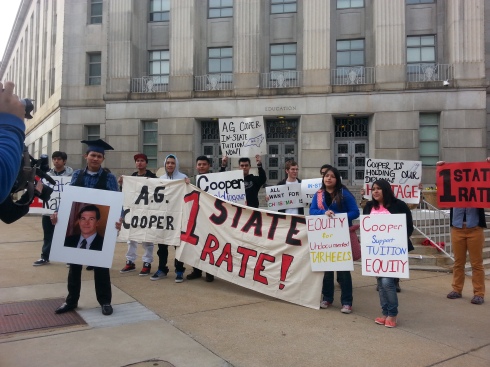You are currently browsing ncdreamteam’s articles.
Monday, January 27th, 2014
Contact: Viridiana Martinez
Cell: (919) 704-0599
Father of Eastway and Northern students scheduled for deportation on Tuesday night
Supporters will meet at 7pm at El Centro Hispano in Durham, NC
Durham, NC – On January 27th, 2014, supporters and community members will gather to urge Immigration and Customs Enforcement (ICE) to stop the deportation of Hugo Leonel Perez Ramirez (A# 077-665-965) who is set to be deported this Tuesday night, January 28th. If deported, Hugo Leonel will be separated from his wife, who is recovering from arm surgery and has diabetes, and youngest son, Rhodinson, who is a U.S. citizen.
On December 23, 2013 in the morning, ICE raided the home of Hugo Leonel and his family at 5am while they were sleeping. Without a knock at the door, ICE entered Hugo Leonel’s home, walked up the stairs, handcuffed and dragged him out. Hugo’s older sons cried and pleaded for ICE agents to take them instead of their father, but their cries were ignored. Their father was ripped away from them and their family was torn apart that morning. Hugo Leonel is, currently, being held in Stewart Detention Center and faces imminent deportation.
Hugo Leonel came to North Carolina from Guatemala in 2006 in search of a better life. His first attempt to reunite with his family was in 2000 but he was caught at the border and deported. According to the 2011 Morton Memo, he is a low-priority case and based on Acting ICE Director John Sandweg’s recent memo, Hugo Leonel’s deportation should be stopped immediately as he is the only breadwinner for his children and wife, Edilma.
WHEN: Monday, January 27, 2014
TIME: 7pm
WHERE: El Centro Hispano, 600 E Main St, Durham, NC
WHO: NC Dream Team and El Centro Hispano
For more information, visit the online petition at: http://action.dreamactivist.org/northcarolina/hugo
###
The North Carolina Dream Team is the first independent undocumented youth-led organization in the Carolinas.
To: Office of the Attorney General
From: Elizabeth Simpson, Attorney & the N.C. DREAM Team
Date: January 9, 2014
Re: In-state tuition for DACA beneficiaries
I. Background on the Deferred Action for Childhood Arrivals (DACA) Program
On June 15, 2012, President Barack Obama announced the creation of a new legal program called Deferred Action for Childhood Arrivals (“DACA”). Administered by the U.S. Citizenship and Immigration Services (“USCIS”), an agency of the U.S. Department of Homeland Security (“DHS”), DACA grants an indefinitely renewable legal permission to remain in the United States to children who were brought to the United States by their parents at a young age and have proven their integration into society by attending or graduating high school. The USCIS began formally accepting DACA applications on August 15, 2012. In order to qualify for DACA, an applicant must generally meet the following requirements:
a) Under the age of 31 as of June 15, 2012;
b) Moved to the United States before his 16th birthday, and has continuously resided in the United States since before June 15, 2007;
c) Was physically present in the United States, with no lawful immigration status, on June 15, 2012;
d) Is currently in school, or graduated from a U.S. high school; and
e) Has not been convicted of any one of a long list of disqualifying crimes, and does not represent a danger to public safety.
Although DACA is a new program, DACA is but one form of deferred action, which has a long history in U.S. immigration law. (Indeed, John Lennon was famously granted deferred action in 1975, see Lennon v. INS, 527 F.2d 187, 190-91 (2d Cir. 1975)). The executive’s power to grant deferred action stems not from any particular statutory authorization, but rather from the executive’s inherent power to exercise discretion in its immigration enforcement activities. See Reno v. Am.-Arab Anti-Discrimination Comm., 525 U.S. 471, 483-84 (1999). Nonetheless, the category of deferred action is recognized and referred to in various places in the U.S. Code, including 8 U.S.C. §§ 1151, 1154, and 1227, and 49 U.S.C. § 30301.
Likewise, various sections of the Code of Federal Regulations recognize that deferred action beneficiaries are deemed lawfully present for most purposes under federal law. See, e.g., 6 C.F.R. § 37.3 (defining “approved deferred action status” as “lawful status” for the purpose of federal REAL ID drivers’ licenses); 8 C.F.R. § 1.3(a)(4)(vi) (defining any “[a]liens currently in deferred action status” as an “alien who is lawfully present in the United States” for the purposes of applying for Social Security benefits); 8 C.F.R. § 274a.12(c)(14) (listing “[a]n alien who has been granted deferred action” as one of the “[c]lasses of aliens authorized to accept employment”); 20 CFR § 416.1618(b)(11) (listing “[a]liens granted deferred action status” as “permanently residing in the United States under color of law” (emphasis added)); 45 C.F.R. § 152.2(4)(vi) (defining “[a]liens currently in deferred action status” as “lawfully present”).
DACA beneficiaries (i.e. ,individuals who apply for and are granted DACA) are given legal permission by the U.S. government to remain in the United States for a two-year period, indefinitely renewable. The DACA program contains no end date or sunset clause, nor can a DACA beneficiary age-out of coverage under the program, nor is there any limit on the number of times that a beneficiary might renew her DACA. In other words, as long as a DACA beneficiary keeps renewing her DACA every two years, she has every expectation of being able to legally remain in the United States permanently, with no legal obligation ever to return to her country of origin. DACA beneficiaries are also granted employment authorization by the U.S. government, which gives them the legal permission to work in the United States. They are also eligible to obtain a Social Security number and apply for Social Security benefits. See http:// http://www.dhs.gov/deferred-action-childhood-arrivals#0
II. Some Quick Facts About DACA Beneficiaries
• As of September 2013, about 19,876 students had applied for DACA from the State of North Carolina. Over 15,000 had been approved. See http:// http://www.uscis.gov/sites/default/files/USCIS/Resources/Reports%20and%20Studies/ Immigration%20Forms%20Data/All%20Form%20Types/DACA/daca-13-9- 11.pdf
• More than 2/3 of DACA applicants arrived in the United States when they were under 10 years of age. http://www.huffingtonpost.com/2013/08/16/deferred- action-applicant_n_3769083.html
• About 72% of DACA applicants had resided in the United States at least 10 years when they applied http://www.huffingtonpost.com/2013/08/16/deferred-action- applicant_n_3769083.html
III. DACA Beneficiaries Can Form the Intent to Stay in North Carolina
By law, North Carolina public colleges and universities grant in-state tuition status to North Carolina domiciliaries. N.C.G.S. 116-143.1(b). “Domicile is one’s permanent, established home as distinguished from a temporary, although actual, place of residence.” Norman v. Cameron, 127 N.C.App. 44, 49 (1997); see also N.C.G.S. 116-143.1(c). A domicile is the place where one makes one’s home.
Currently, North Carolina’s colleges and universities apparently assume (without statutory basis) that neither undocumented immigrants, nor DACA beneficiaries, have the “capacity” to form the requisite intent to become domiciliaries of North Carolina—presumably because these students may be at risk of deportation in the future, which would disrupt their future residence in the State. However, this notion misapprehends the degree of certainty traditionally required for domiciliary intent. “It is not necessary that [a student] should have the intention of always remaining, but there must coexist the fact and the intention of making it his present abiding place, and there must be no intention of presently removing.” Lloyd v. Babb, 296 NC 416, 446 (1979). The idea of remaining in the location “permanently” should not be “taken literally”—because of the myriad controllable and uncontrollable intervening events that may disrupt any person’s intentions regarding the place where she makes a home—whether or not she is an immigrant. Id.
DACA students, with their indefinitely renewable lawful presence, are more than capable of forming the subjective intent to stay and make their home in North Carolina. They are quite dissimilar to holders of unexpired B (tourist), J (exhange program), or C (transit) visas, for instance—persons who have been in the United States only a short period of time, and who have explicitly promised to return to a foreign home on a fixed date. In contrast, DACA beneficiaires are—by definition—immigrants who have grown up in the United States, have attended high school in the United States, and who have expressed an explicit intention to remain in the United States indefinitely. Moreover, the federal government has granted DACA beneficiaries permission to fulfill this intention.
IV. For Purposes of In-State Tuition, DACA Beneficiaries Are Indistinguishable from TPS Beneficiaries
Furthermore, DACA beneficiaries are extraordinarily similar to beneficiaries of another federal immigration program: Temporary Protected Status (TPS)—and North Carolina already permits TPS beneficiaries to demonstrate that they are domiciliaries of the State. See Memorandum of State Residence Committeee (Dec. 11, 2012). There is no legal basis under North Carolina or federal law to distinguish between TPS beneficiaries and DACA beneficiaries.
Also administered by USCIS, TPS grants an indefinitely renewable legal permission to remain in the United States to nationals of certain countries that suffer from unsafe conditions, such as El Salvador, Honduras, and South Sudan. TPS beneficiaries are granted legal permission to stay in the United States for a period of six to eighteen months, indefinitely renewable. Like DACA, the TPS program contains no end date or sunset clause, nor can a TPS beneficiary age-out of coverage under the program, nor is there any limit on the number of times that a beneficiary might renew her TPS. TPS beneficiaries are granted employment authorization, which gives them legal permission to work in the United States. They are eligible to obtain a Social Security number and apply for Social Security benefits. See http://www.uscis.gov/humanitarian/temporary-protected-status-deferred-enforced-departure/temporary-protected-status.
DACA beneficiaries and TPS beneficiaries both apply for recognition on nearly identical forms (Form 821 v. Form 821d). Both are groups of individuals that the United States could lawfully choose to deport—but has explicitly chosen to give permission to stay. Therefore, both DACA beneficiaries and TPS beneficiaries can reasonably expect to lawfully remain in the United States indefinitely. There is no reasonable distinction between the two groups under North Carolina’s law of “domicile.”
V. Conclusion
The Attorney General should interpret North Carolina law consistent with traditional common law concepts of domiciliary intent, and consistent with the State’s December 2012 determination to grant in-state tuition to TPS beneficiaries who are otherwise eligible.
I’m Oliva Prezas Garces. I am an undocumented student and currently a DACA holder. I was brought here to North Carolina when I was 4 years old. I graduated from high school in 2012 as an honors/AP student. My plan after high school was to attend a four year university and pursue a BS in biology. However, I was not able to follow my plan. All of the universities were rating me as an out-of-state student because of my undocumented status. Most of the scholarships that I could have qualified required US residency, and those that didn’t were very competitive. Financial aid was also not an available option. The possibility of going to college was impossible.
As a result, I did not attend a university. Instead, I am working full time at a factory so I can attend a local community college where I am also charged at the out-of-state tuition rate, even though I graduated from high school here. Last semester, I payed $2600 for 3 classes; that is 3 times more than my high school classmates who are charged at the in-state tuition rate pay. This is unfair because I have lived here almost my entire life. I was raised here. I overcame the challenge to learn english. I gave my academics top priority. My future is here in North Carolina and this is my home.
Attending Vance Granville Community College is a major challenge to me. Everyday, I worry that I will not have enough money to pay the high cost to take classes there. What if I lose my job? Or even worse, what if I don’t graduate on time because I cannot pay my tuition? All of that time, money, and hard work will go to waste.
However, this could all change with the support of Attorney General Roy Cooper. His signature in support of in-state tuition for students like me will change our lives forever. With the stroke of a pen, he can change the direction of my future and the future of North Carolina as there are thousands of others like me. Difference is I will no longer remain in the shadows about my struggle. For 3 months now, we have requested the support of Attorney General Cooper. What is the hold up???
When I was little, I accompanied my mother to the doctor because she broke her leg. My mother was in pain and stressed out. She was missing days of work and getting backed up on paying the bills. The doctor helped my mother and since then, I have known I want to become a doctor because I want to help others the way that doctor helped my mother. Specifically, my dream is to become an Orthopedic Physician’s Assistant. Why is Attorney General Cooper refusing to support students like me? On Saturday, January 11th I will be marching from UNC Chapel Hill to Attorney General Cooper’s office to hold a funeral for my dream. Will you march with me? You can register here: https://docs.google.com/forms/d/1z_NIRtwtgA6E35sEN8jtxeYiMa0kgW9CLugR3EaHmU0/viewform
Thank you for your support!
Hello, my name is Juan Prezas. I am 23 years old and I have been living in North Carolina since I was 9 years old. When my family first moved to North Carolina, I thought everything would change for the better, but it was easier said than done. Learning a new language and trying to fit in was not easy, but I stepped up to the plate.
Throughout my middle school and high school years, my parents always encouraged me to be the best student I could be. I worked hard. But when I graduated from high school, my future was uncertain. My family’s financial situation was unstable, so to help contribute to the household, I opted to work and put my education second. I had to save enough money to attend my local community college. But when I tried to enroll, I was met by bad news: undocumented students were not allowed to attend community colleges or universities without a social security number.
After finding out that I could not go back to school, I worked for another year. All I could do was try to get my mind off my situation, I felt hopeless. I was stuck in a minimum wage job with no possibilities of going to college. I was banned.
It was until 2011 when I returned to my Vance Granville Community College to try to enroll in classes. That year I was allowed to register for classes, but I had to pay out-of-state tuition. The tuition for out-of-state students was and remains nearly four times the in-state tuition cost. When I heard the amount of money that I had to pay to go back to school, I was unsure if going back to school was the right thing to do. The more I though about it, I became convinced that I was unhappy with my job that only paid minimum wage. So, out-of-state tuition and all, I decided to go back to college.
My first semester at my local community college, I paid about 1,900 dollars and my tuition steadily increased as I took more classes each semester. Graduation seems like something out of my reach if I have to continue paying out-of-state tuition. My dream of becoming an engineer has already been deferred. The damage has already been done. But that can change if Attorney General Cooper supports me. The federal government has already allowed me to legally work here and I have a social security number through the DACA program. So, why keep me from attending college and contributing to my state?
On Saturday, January 11th, 2014, I will be joining four other DACA students like me. We will march from UNC Chapel Hill to Attorney General Roy Cooper’s office. Every day he refuses to support students like me, he is killing our futures. The March of Broken Dreams will culminate with a funeral outside of his office. I hope you can be there. But if you can’t, sign and share the petition calling on Attorney General Cooper, the UNC Board of Governors, and the NC Community College System to give DACA students in-state tuition now. Here it is: http://action.dreamactivist.org/northcarolina/instate.
Thank you for your support.
La siguiente presentacion les explica sobre la ley que permite a los empleadores de Carolina del Norte patrocinar a sus empleados. Con patrocinarlos, los empleados podran pagar la matricula como residente del estado en los Colegios Comunitarios (Community College).
Si tiene alguna pregunta o desea tener un taller en su comunidad, comuniquese con nosotros a:
dreamteamnc@gmail.com
kenyodair@gmail.com
whhs.rinka10@gmail.com
Titule su email: “Pregunta SYE – (Su Nombre)
o “Taller SYE – (La Ciudad)
Secure Your Education Presentation
This SYE Presentation will explain the process for a North Carolina employer to sponsor their NC employee, allowing the employee to pay in state tuition at community colleges.
If you have any questions or would like a workshop in your community, contact us:
dreamteamnc@gmail.com
kenyodair@gmail.com
whhs.rinka10@gmail.com
Title your email: “SYE Question – (Your Name)
or “SYE Workshop – (Your City)”

Rocio is from High Point, North Carolina. She was brought to the US when she was just 4 years old. Rocio graduated high school and aspired to continue her education. Almost 5 years ago, Rocio made the decision to self-deport to Mexico. Like many others before the DACA announcement last year, she felt her future was non existent because she could not pursue her dream of attending college. But it was harder than she expected.
Living in Mexico after growing up here was like going to live in a foreign country. And that’s not to mention the increasing crime and violence in Mexico. Rocio’s only aspiration is to come back home, reunite with her family, and contribute to her community.
Rocio was one of the #Dream30 who were denied credible fear. She could be deported at any moment. She needs your help to come back home to High Point, NC.
What you can do:
Make a Call to the following Immigration Reform Champions and tell them to #BringThemHome!
Senator Menendez at 202-224-4744
Congressman Becerra at 202-225-6235
Congressman Pastor at 202-225-4065

Special thanks to Don Becerra, Lagos Meat Market, Homegrown City Farms, Ivan Almonte, La Loma Panaderia, Peluqueria Dalana, and Daniel Teodoro for making this sale possible!
Secure Your Education! In-State Tuition for DACA Students Through Their Employers!
Dear fellow UNDOCUMENTED students,
After being able to get in-state tuition with my employer I decided to pass on the word and let others know to make sure it was an option for others with DACA as well. To our advantage, it was a success and a memo has been sent to the community colleges that students with DACA can qualify for in-state tuition through their employers.
With that being said the NC Dream Team will be hosting a Secure Your Education Training this Saturday, October 19, 2013 at the Holton Career and Resource Center in Durham, NC at 1:30 pm.
Address:
401 N Driver St
Durham, NC 27703
The training will show you the documents that you will need when registering for your classes so that you can be eligible for in-state tuition. It will last about an hour and a half.
Please come by because this is only the first step at getting tuition equity for all students regardless of race, gender, and legal status.
Thank you everyone,
Darinka Gonzalez
NCDT Member
NC DREAM TEAM
ncdreamteam.org
FOR IMMEDIATE RELEASE
Monday, September 30th, 2013
Contact: Cinthia Marroquin
919-985-5868
Sept 30: 30 Dreamers to Cross Border Asking Obama to ‘#BringThemHome’
Thirty Dreamers will Ask Obama to ‘Bring Them Home’
NATIONAL—The National Immigrant Youth Alliance will hold its second border protest on Monday, September 30. 30 Dreamers will participate in the action as part of the ‘#BringThemHome’ campaign.
Two weeks ago, the president and House Republicans dashed the immigrant community’s hopes for relief this year. We are here to remind them to not give up hope; we can fight the broken immigration system ourselves.
The Dreamers will present themselves at a port of entry, wearing caps and gowns, asking to be permitted into the United States. In July, nine Dreamers presented themselves at the Morley Gate at the port of entry in Nogales, Arizona. It took seventeen days for the Obama Administration to make the right decision and allow them to return home, during which the nine Dreamers were detained in Eloy Detention Center.
The participants in the Sept. 30 action are hoping to return to their lives in Arizona, California, Georgia, Florida, Illinois, Indiana, Massachusetts, Michigan, Minnesota, North Carolina, New York, Ohio, South Carolina, and Texas. Not all of the participants are living in Mexico, but have come from elsewhere to participate in the action.
Here in Raleigh, the NC Dream Team will hold a rally in solidarity with the Dream30 and the 4 Dreamers coming back to North Carolina.
When: Monday, September 30th, 2013 @ 6:00pm
Where: 436 N. Harrington St Suite 100 Raleigh, NC 27603
The fight to keep families together happens every day, everywhere that immigrants fear leaving their homes and being separated from their families. We are putting back together the families that the president and unjust laws have broken apart.
#
The NC DREAM Team is an organization composed of undocumented immigrant youth and allies. We are dedicated to the creation of a sustainable, community-led immigrant rights movement in North Carolina. We aim to help undocumented youth recognize our individual and collective power to activate our communities. We also aim to create awareness of the broader struggle for social justice. We do not shy away from purposeful direct action and civil disobedience in the pursuit of a more just future for our immigrant community.




